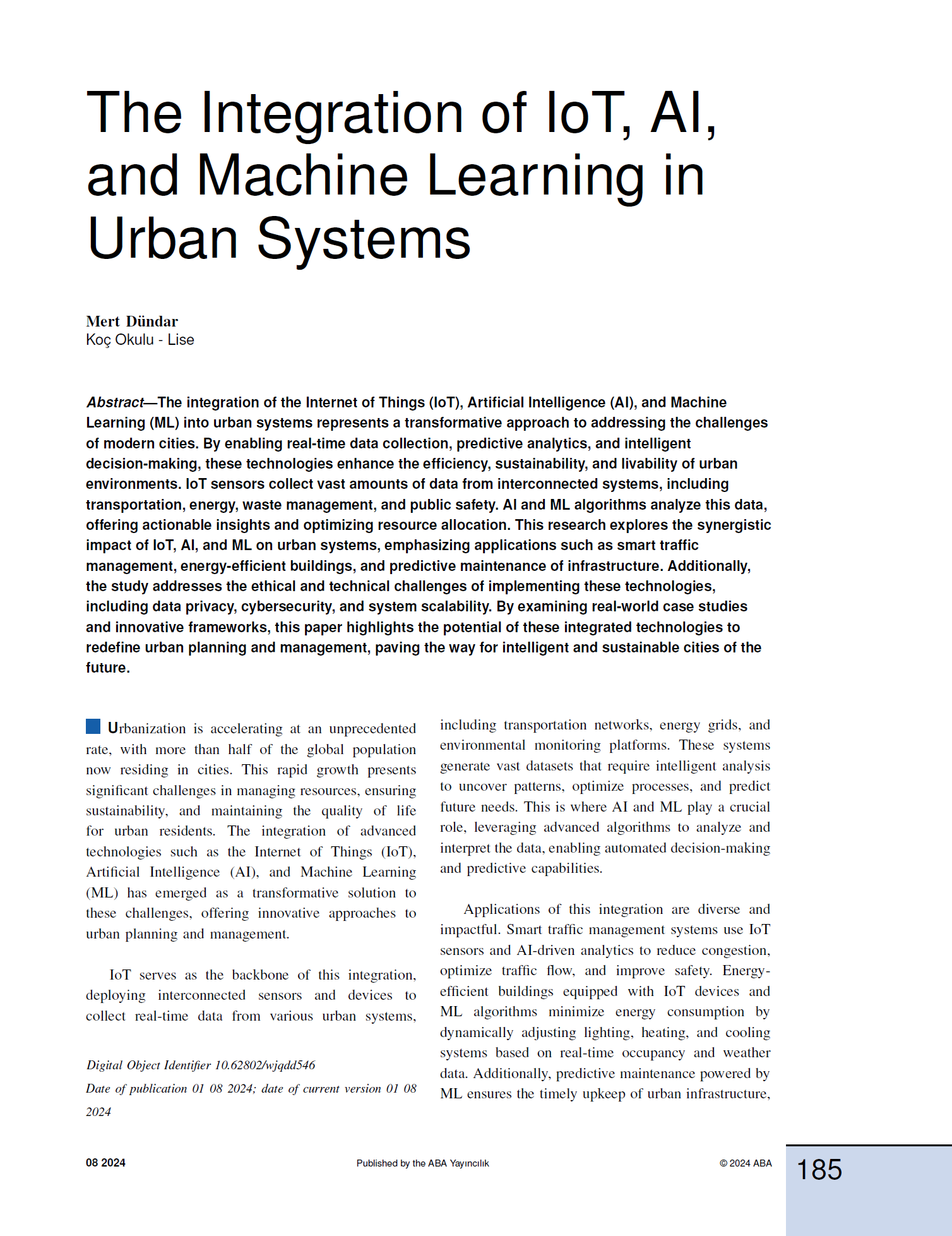The Integration of IoT, AI, and Machine Learning in Urban Systems
DOI:
https://doi.org/10.62802/860ded41Keywords:
IoT, Artificial Intelligence, Machine Learning, smart cities, urban systems, predictive analytics, resource optimization, real-time data, sustainability, intelligent infrastructureAbstract
The integration of the Internet of Things (IoT), Artificial Intelligence (AI), and Machine Learning (ML) into urban systems represents a transformative approach to addressing the challenges of modern cities. By enabling real-time data collection, predictive analytics, and intelligent decision-making, these technologies enhance the efficiency, sustainability, and livability of urban environments. IoT sensors collect vast amounts of data from interconnected systems, including transportation, energy, waste management, and public safety. AI and ML algorithms analyze this data, offering actionable insights and optimizing resource allocation. This research explores the synergistic impact of IoT, AI, and ML on urban systems, emphasizing applications such as smart traffic management, energy-efficient buildings, and predictive maintenance of infrastructure. Additionally, the study addresses the ethical and technical challenges of implementing these technologies, including data privacy, cybersecurity, and system scalability. By examining real-world case studies and innovative frameworks, this paper highlights the potential of these integrated technologies to redefine urban planning and management, paving the way for intelligent and sustainable cities of the future.
References
Bibri, S. E., Huang, J., & Krogstie, J. (2024). Artificial intelligence of things for synergizing smarter eco-city brain, metabolism, and platform: Pioneering data-driven environmental governance. Sustainable Cities and Society, 108, 105516.
Chen, G., & wan Zhang, J. (2024). Intelligent transportation systems: Machine learning approaches for urban mobility in smart cities. Sustainable Cities and Society, 107, 105369.
He, W., & Chen, M. (2024). Advancing Urban Life: A Systematic Review of Emerging Technologies and Artificial Intelligence in Urban Design and Planning. Buildings, 14(3), 835.
Jyothi, V., Sreelatha, T., Thiyagu, T. M., Sowndharya, R., & Arvinth, N. (2024). A data management system for smart cities leveraging artificial intelligence modeling techniques to enhance privacy and security. Journal of Internet Services and Information Security, 14(1), 37-51.
Prakash, J., Murali, L., Manikandan, N., Nagaprasad, N., & Ramaswamy, K. (2024). A vehicular network based intelligent transport system for smart cities using machine learning algorithms. Scientific reports, 14.
Rajkumar, N., Viji, C., Latha, P. M., Vennila, V. B., Shanmugam, S. K., & Pillai, N. B. (2024). The power of AI, IoT, and advanced quantum based optical systems in smart cities. Optical and Quantum Electronics, 56(3), 450.
Rane, N. L., Paramesha, M., Rane, J., & Kaya, O. (2024). Artificial intelligence, machine learning, and deep learning for enabling smart and sustainable cities and infrastructure. Artificial Intelligence and Industry in Society, 5, 2-25.
Ullah, A., Anwar, S. M., Li, J., Nadeem, L., Mahmood, T., Rehman, A., & Saba, T. (2024). Smart cities: The role of Internet of Things and machine learning in realizing a data-centric smart environment. Complex & Intelligent Systems, 10(1), 1607-1637.
Van Hoang, T. (2024). Impact of integrated artificial intelligence and internet of things technologies on smart city transformation. Journal of Technical Education Science, 19(Special Issue 01), 64-73.
Wu, P., Zhang, Z., Peng, X., & Wang, R. (2024). Deep learning solutions for smart city challenges in urban development. Scientific Reports, 14(1), 5176.









